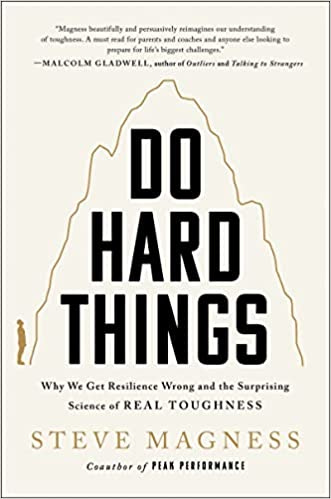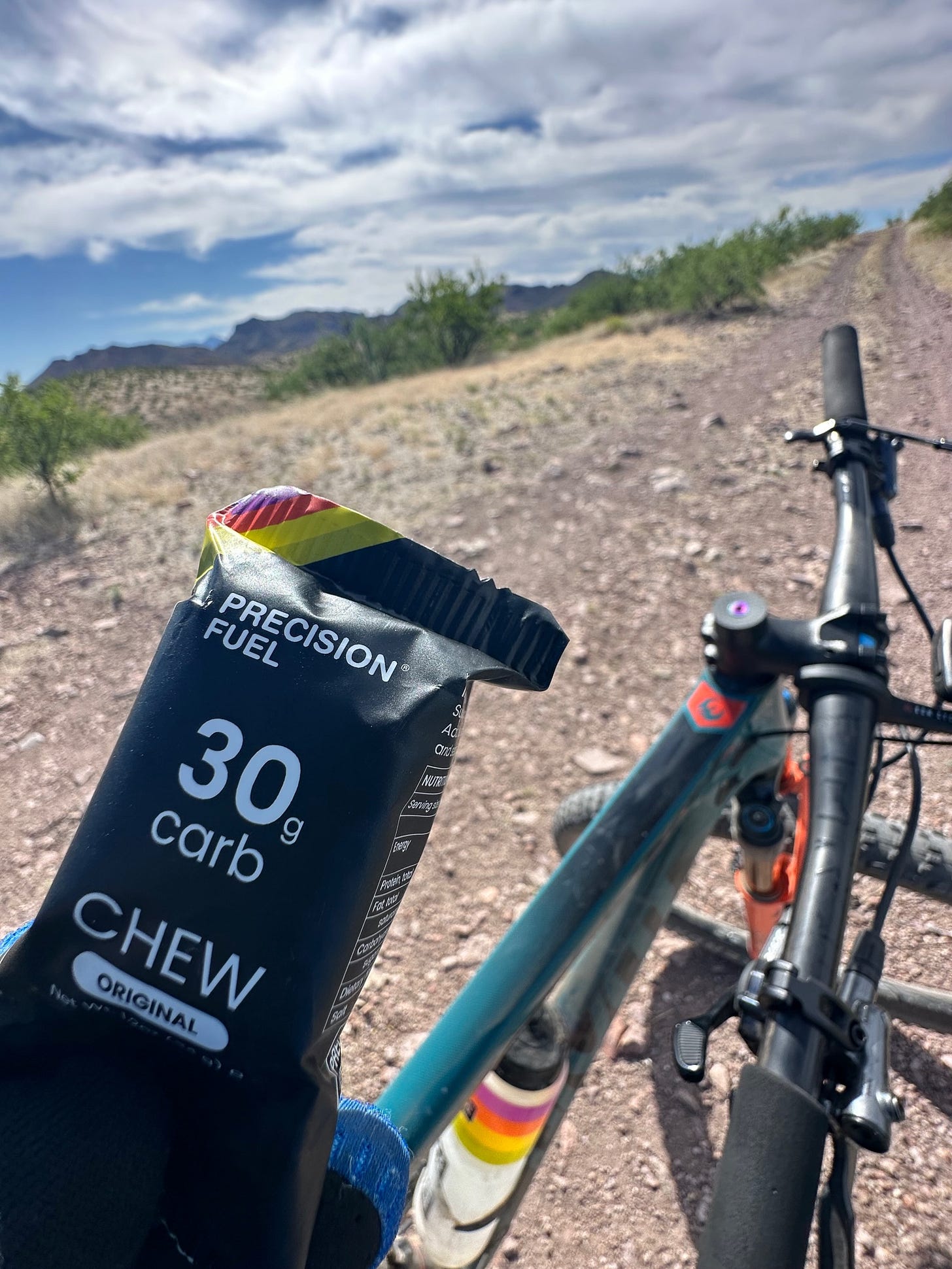I can conjure up hundreds of excuses:
I had a beer last night.
I ate too soon before the ride.
I did not sleep well.
I have had more than normal stress this week.
Etc…
Simple fact is, I cracked. I gave in to the physical and mental anguish of my intervals. And that is OK. Too many times in the past, I have given myself more mental anguish by berating myself for giving up. I’m sure this feeling comes from my upbringing and especially my participation in Texas High School football. I say participation because I didn’t play much and any playing time was a consequence of me knowing every play and where every person needed to be in the play. So I was the player that communicated the plays in huddle. I played through 9th grade before moving to Arizona.
Through playing football or similar activities trying to toughen us through callousness, we train ourselves to respond to fear and power. In the book, Do Hard Things by Steve Magness, he says,
The reason we push through discomfort is because we imagine someone (football coach) standing over us yelling or that if we fail, we will face punishment. We’ve been conditioned to see the external as more important than the internal.”
He goes on describing that to be truly “tough” we need internal tools on how to deal with adversity. This is what will get us through the tough miles we have on the bike. And yes, we will all have tough miles. I encourage you to read his book. He goes into the science of what truly creates toughness and how to attain the tools to get you there. I’ll give you one hint: Fear and Power do not create toughness.
So I am Ok with cracking. It gives me insight to where I am with my fitness and where I am with these horrible horrible Rønnestad Intervals.
My “Crack” date was May 19th and then I started a recovery week. At the end of my recovery week, I planned another attack on my field test hill. If you go back to my original Leadville Plan, I was aiming for a 5% increase. I managed 314 watts on my field test compared to 300 watts 6 weeks prior which is roughly 4.5%. Not what I wanted but close and the effort gave me good indications that I was on the right track. I did not struggle as before and I also did not stand as much while climbing. It was a maximum effort but I felt good about it versus just surviving the previous effort.
With that, my Leadville plan has not changed much from my original plan. I am currently doing some sub-Threshold repeats which allows me to increase volume and builds up my ability to reproduce a similar power that I will use at Leadville. I am still aiming for 4 watts per kilogram for 60 minutes. Currently, I am modeled at 4 watts per kilogram for 43 minutes.
From what Coach Rose Grant and I see, I am on track and just need to fine tune a few details:
Endurance
Leadville is 104 miles with almost 12,000 feet of elevation gain. That equates to about 5000 kilojoules (kj) of work on average for an athlete to finish this event whether that finish time is 7 hours, 9 hours, or 12 hours. In other words, it’s a very big day on the bike. I am not naturally (physically or mentally) a great rider for very big days on the bike. When I raced, I was best at Short Track XC (25 minutes) and Cyclocross (60 minutes). I have done well in events of 3-4 hours but beyond 5 hours with my typically aggressive riding style, the course gets the best of me. Thus I need extra work in the area of endurance and I need to ride a relatively conservative pace.
For my athletes, I suggest they get 1-2 rides of 3500+ kj with one of those days being 4000 kj prior to Leadville. This is not mandatory but suggested as it prepares you in many ways. This prepares you mentally for the long day and physically for the muscular fatigue you will feel in your legs, your arms and from sitting in your saddle. You want to be as prepared as possible and this is one of the mental tools you’ll use to overcome the adversity of the day.
So far, I have done two 2600 kj days which is just under 5hrs and both have left me wasted sitting on the couch for the remainder of the day.
In the coming weeks, I plan to do two rides in the 3500 kj range.
Nutrition
Another reason for bigger rides is to practice my race fueling. When rides are sub 5 hours, your nutrition is important but if you make mistakes, it’s not critical to you finishing the ride. Over 5 hrs and in my experience, athletes that make big mistakes pay big prices. Big mistakes would include not eating enough, not drinking enough water, eating too much, etc… Big prices ultimately equate to not performing your best or even not finishing your event.
At Leadville, you see most people that made fueling mistakes sitting on the side of the trail up the Powerline climb. This is about 80 miles into the event and maybe their stomach went sour prior to that but that climb is brutal and if you are about to crack you will crack here. You need all your capacities to get over this 3.5 mile climb.
Studies have been showing more and more that athletes can absorb over 100g of carbohydrates per hour. Studies also show that you can train your gut’s ability to absorb carbohydrates. This “training” to absorb more carbohydrates can take weeks so if you are aiming to increase your ability to absorb carbohydrates, now is a good time to start for Leadville.
I do suggest a metabolic test to get a good understanding of how many carbs you burn versus fat at specific intensities. With this information along with the information of your planned intensity at Leadville, you can make quality assumptions on how many calories and what kind of calories you should plan for at Leadville or any event for that matter. In almost all cases, carbohydrates are your main fuel source.
I’ve been practicing taking in 75g of carbohydrates per hour and 1000 mg of sodium per hour along with 750ml of fluid per hour. I say practice as I take that much with me but I have yet to eat and drink that much on my two bigger 2600 kj rides. So I am making a few changes to help keep me on track by adding a couple of bars to my race nutrition and some 30g chews by Precision Hydration. I have been using only drink mix.
.
I encourage everyone to use the Precision Hydration Hydration and Fueling Planner to help them in their events. This planner will lay out a plan for you on how to fuel properly during your events.
Recovery
The last thing I am currently fine tuning is my recovery. Recovery is just as important as any 3500 kj ride or set of intervals. Without Recovery, you cannot adapt and thus become better.
Your number one recovery tool is sleep by far. There are many recovery modalities out there like compression boots, ice baths, massage, protein drinks, etc… but they all pale in comparison to sleep. Best thing about sleep is it’s free.
Another book, I highly recommend is Why We Sleep by Dr. Matthew Walker. He details out all the important things sleep gives you and how to get the best sleep in his book. He also has a good podcast.
In this book, he talks much about alcohol and how it affects your sleep. I’m sure many of us know how it helps us fall asleep but the quality of that sleep after a night with alcohol does not equal quality sleep. Thus I am mostly abstaining from alcohol till Leadville race day. I say mostly because I do expect a couple of occasions where I may have a beer in the next two months.
During Covid, I found myself having 1-2 drinks per night almost every night and post covid, I really haven’t slowed down. I have not increased this amount but I have not decreased it either. I’ve tried to stop a few times and I last a couple of weeks but then get started again.
I know this has now become a habit and it causes much more health issues than just affecting my sleep. So Leadville is a good excuse to change this habit. It’s been 3 weeks now and I really haven’t missed my nightly drink.
I do see Leadville and other events like it as something so BIG that it changes you. The preparation for the event changes you in many ways and these changes often stick around. This is one of the most profound things I see with my athletes. After Leadville, more is possible. Change is possible. The changes are not always permanent but it does give each of us insights to what it’s like to be our best and that’s the goal of Tenac Championship Coaching.








